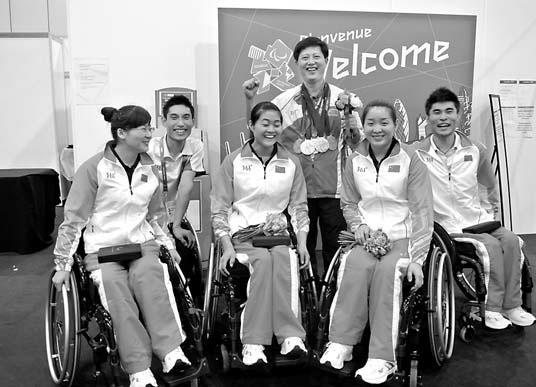Ping-pong coach goes to bat for disabled athletes
Updated: 2014-04-20 08:01
By Zhao Shengnan (China Daily)
|
|||||||||||
|
Heng Xin's students pocketed eight gold medals at the 2012 London Paralympics. Provided to China Daily |
Heng Xin, 49, failed to realize his dream of becoming a professional athlete or an Olympic medalist, but he believes he has gained more by being a coach of disabled ping-pong players.
"I just wanted to help them to take exercise at first, and Olympic medals were like a weak light shining so far away," says Heng, a coach for China's Paralympics ping-pong team and a teacher at a sports school in Xuzhou city in East China's Jiangsu province.
His disabled students pocketed seven golden medals at the 2008 Beijing Paralympics and eight more at the 2012 London Games.
In 2000, Heng, then a worker at a local waterworks and an amateur ping-pong player, visited a rehabilitation center for children with polio in Xuzhou. He said he was "overwhelmed by depression" seeing so many kids confined to wheelchairs or relying on crutches.
After learning of their interest in sports, Heng, who ran a private ping-pong club in his spare time, volunteered to start a ping-pong team for 26 students at the center, despite having no previous experience training disabled people or any idea of the disability categories athletes are divided into according to their level of impairment.
They set up the tables in a tent, but Heng soon found it was impossible to use the same teaching methods he used at his club with the disabled students, as they were unable to do the basics, such as pulling their chests and stomachs in, or even warming up.
"Sitting in their regular wheelchairs, instead of sports ones, they could only rub their hands together to warm up while the rest of the body stayed the same, so they all suffered from chilblains in the harsh winter of northern Jiangsu," Heng says.
Heng refitted the wheelchairs to make it easier for the kids, until the arrival of sports wheelchairs six months later.
The ages of Heng's first batch of 26 students ranged from 7 to 17, and he taught them the ping-pong moves "bit by bit".
"I was surprised by their diligence and the progress they made. It was evident that they valued this opportunity more than those at my club and they practiced much, much harder," Heng says.
"They can do many of the shots better than me now. And that's not easy," he says, smiling.
But even more than their prowess with their bats, Heng got a bigger sense of fulfillment from the psychological changes he saw in his students as they learned to play the game.
"Many kids were introverted or felt inferior when we first met. Some of them used to crawl on the ground, looking up at the others," he says.
"Through playing ping-pong, they know they can stand up and they can achieve a lot as long as they try hard - especially after participating in so many major games and even standing on the top podium at the Paralympics. I can say every team member is quite open-minded now."
In 2013, Heng was transferred from the waterworks to a local sports school to better train his students. He also gave up his own club years ago for the same purpose.
"My friends once questioned me about how I helped a disabled kid win the gold medal, but over the past decade, it has been my students who helped me to understand there is no gain without pain, and they helped me to realize my dream," he says.
Heng called for more support for disabled athletes in training, infrastructure and employment after retirement. Unlike the centralized and regular training athletes receive for the Olympics in China, disabled athletes only receive concentrated and less systematic training before major sports events, such as the Paralympics.
"I also hope there will be more sports infrastructure and education opportunities for the disabled in daily life, so they can participate in sports and get to better know the outside world even they are not athletes," Heng says.
zhaoshengnan@chinadaily.com.cn
(China Daily 04/20/2014 page26)
Today's Top News
Putin makes overture to incoming NATO chief
China on frontlines of cyber threat
China raises alert against cancer
William, Kate visit Australian air force base
Ukraine mulls constitutional reform
APEC fuels interest in English
Anti-graft push gives more family time
Property price surge could soon over
Hot Topics
Lunar probe , China growth forecasts, Emission rules get tougher, China seen through 'colored lens', International board,
Editor's Picks

|

|

|

|

|

|






